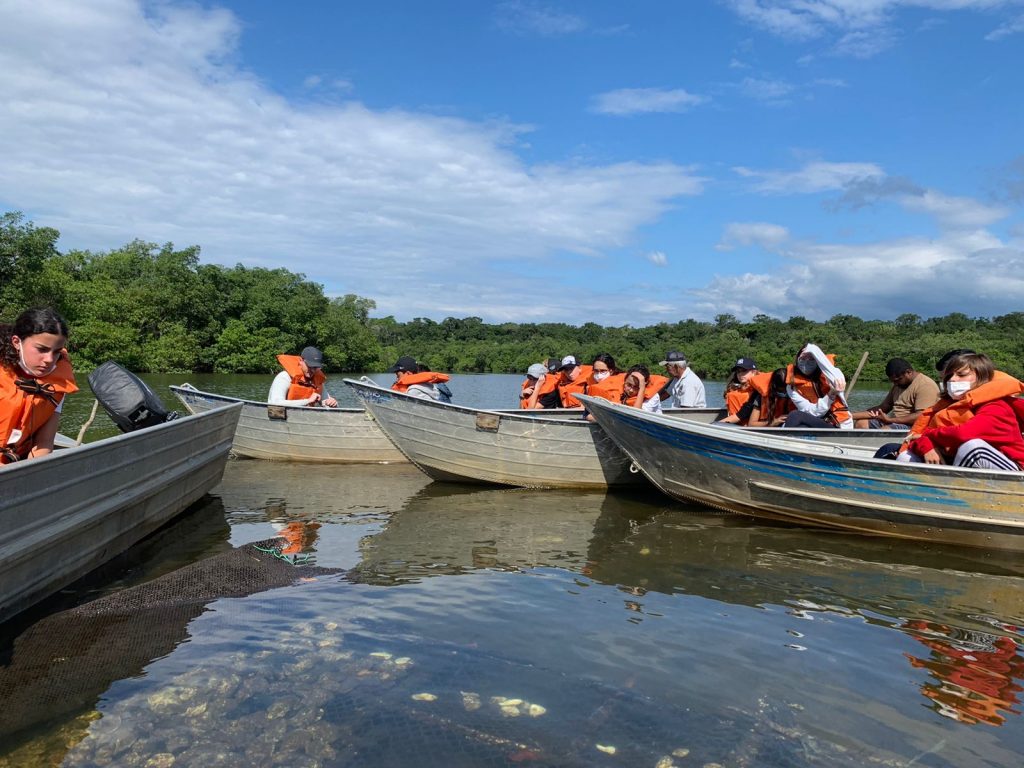What is included?
-
Transportation in an executive bus, with air conditioning, toilet, and minibar for over 30 passengers. Below 30 passengers, transportation may be done in a minibus and below 13 in a van (subject to acceptance by families and the location)
Snack on board on the way
Water available during the trip on the bus
02 Accompanying teachers from the school by bus
01 Accredited Tour Guide from the Ministry of Tourism accompanying the group throughout the trip - Mandatory by Law
Travel insurance
WhatsApp group with guardians before and during the entire trip for sending information and LOTS OF PHOTOS AND VIDEOS
Gallery
Introduction
In the region known as the “nursery of the Atlantic,” Brazolin develops a field study project that places students in front of historical facts and their social and environmental consequences through a dynamic and investigative activity.
The Lagamar region is undoubtedly one of the most suitable for conducting field study trips. The estuarine-lagoon complex formed by the islands and channels houses a great biodiversity that is still preserved, represented by the fauna and flora of coastal ecosystems.
Moreover, the historic cities of Cananéia and Iguape, with their rich architectural heritage, gather treasures from the history of our country.
Using all this natural and historical wealth as a pedagogical resource, students will be protagonists in a fun quest for information and knowledge!
Day 1 - Iguape and North Point of Ilha Comprida
Upon arriving in Iguape, students will be placed in the role of colonizers!
With the help of an image suggesting the untouched Lagamar region, groups will present suggestions for protection, trade, transportation, and settlement of the area. Then, using “gamification” techniques, we will have students seek information about historical, social, and environmental facts that occurred in the region, exploring important points of the city. All activities take place with the mediation of our educators who allocate some moments for debates and information exchange, aligning and adjusting students' conclusions.
After lunch, we will visit the northern tip of Ilha Comprida, an area that has suffered significant social and environmental impacts. By viewing constructions destroyed by the advance of the sea, students will reflect on what happened there, what the causes and consequences were.
The day ends at “Morro do Espia,” a location that was used for the protection of the city of Iguape, where it will be possible to visualize the geography of the region from above, concluding part of the discussions presented throughout the day.
At the end of the day, we will head to accommodation in Cananéia, stopping at the exit of Iguape so that students can see the dam built to try to block the disastrous consequences of the construction of the Canal do Valo Grande.
Day 2 - Ilha do Cardoso
Due to its diverse coastal environments (slope forest, rocky shore, mangrove, and restinga), the State Park of Ilha do Cardoso is a place of great pedagogical and scientific interest.
We will take students to know and interact with all these environments, guided by specialized biologists, monitors, and accredited local guides, with the accompaniment of qualified lifeguards. Students will be placed in locations filled with practices uncommon to their daily lives, in addition to learning to fish using artisanal techniques presented by a local fisherman.
Students will reflect on the occupation of geographic space and its transformation – how it was and what has changed, observing, respecting, and understanding the importance of the Atlantic Forest, restinga, rocky shore, and mangrove.
The transfer between Cananéia and Ilha do Cardoso will be made with exclusive schooners.
Day 3 - South Point of Ilha Comprida and Cananéia
At the southern tip of Ilha Comprida, students will learn about a sambaqui, which is formed by prehistoric accumulation of marine mollusks that served as food for primitive peoples, and will use the quadrant method to identify the structure and composition of a restinga forest.
In a second moment, students will understand how beaches and coastal environments are formed, finishing with leisure moments before a typical caiçara lunch.
Returning to Cananéia, we will stop at the historic center, where students will need to identify counterpoints with the preservation of Iguape's architecture. Our educators will make the necessary adjustments so that all the studied content and students' discoveries fit together and complement each other.
- The Lagamar Paulista Project is one of Ivian's exclusive itineraries that uses the ALEM methodology and works on the following competencies and skills:
- • Intellectual curiosity
- • Culture / Empirical knowledge
- • Inclusion for mutual understanding
- • Critique
- • Protagonism
- • Ethics and citizenship
- • Empathy














